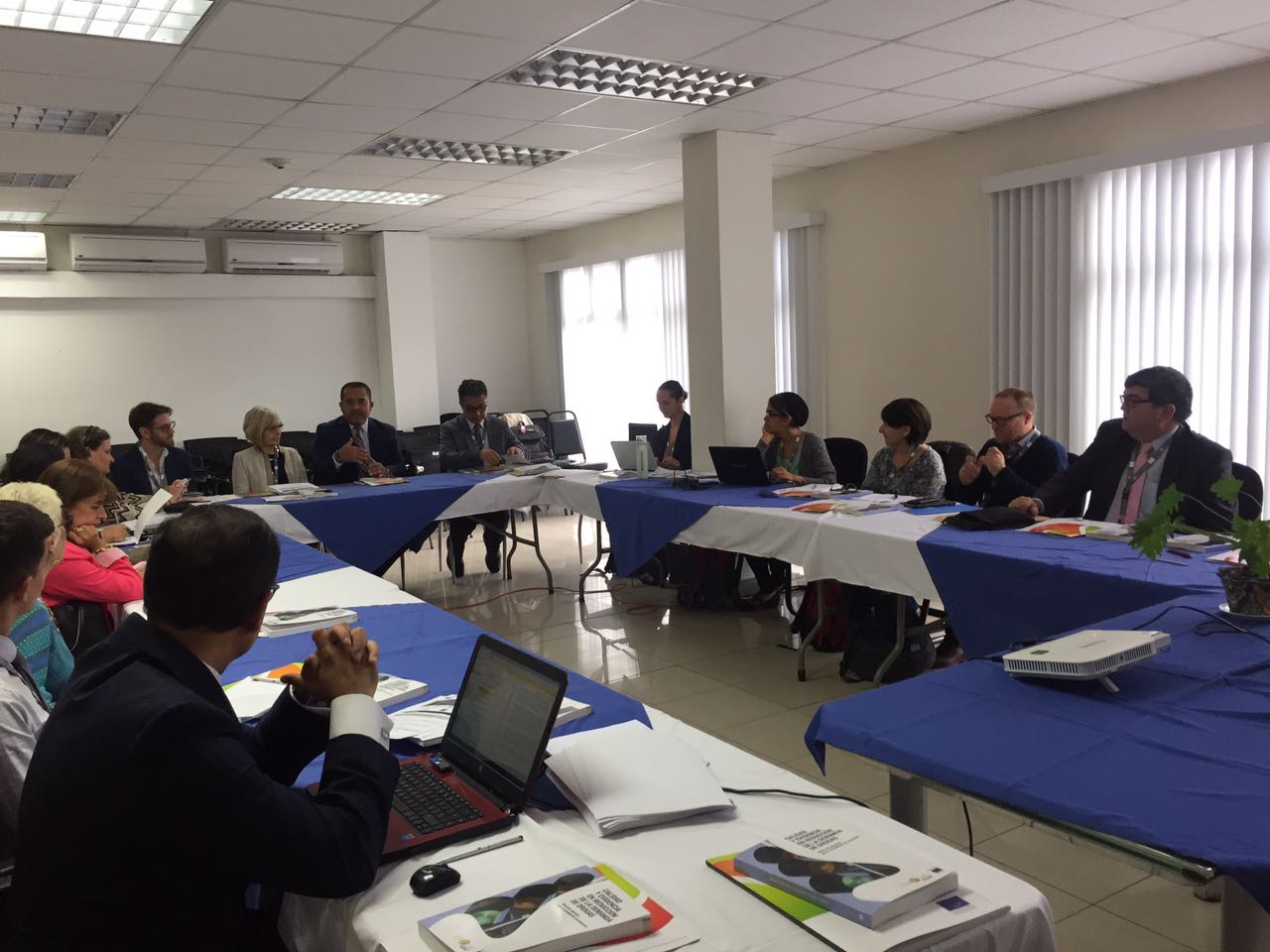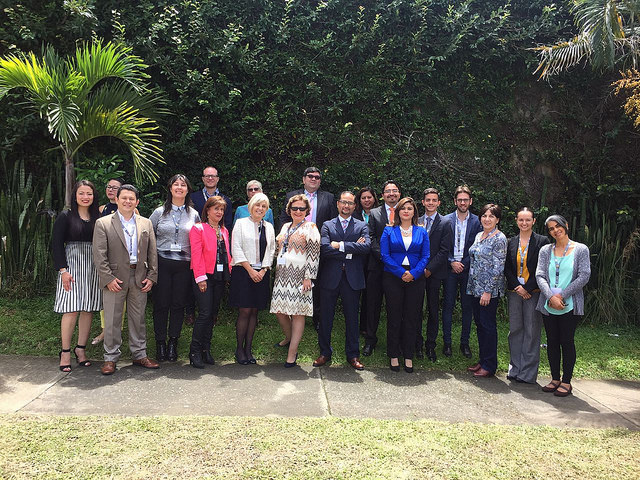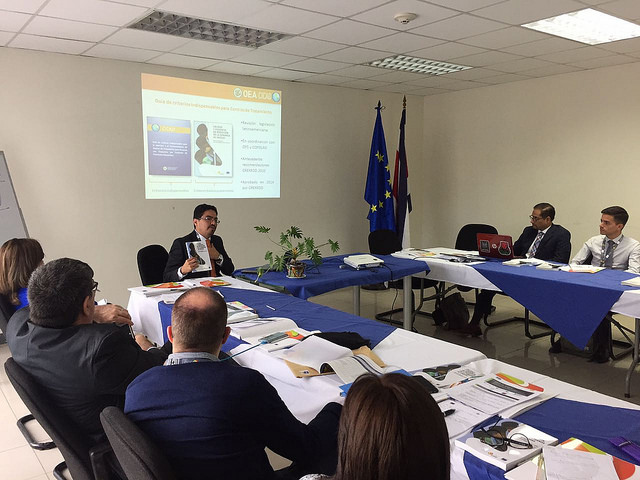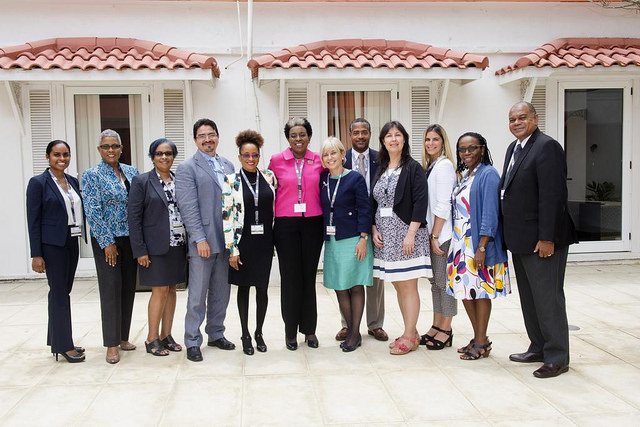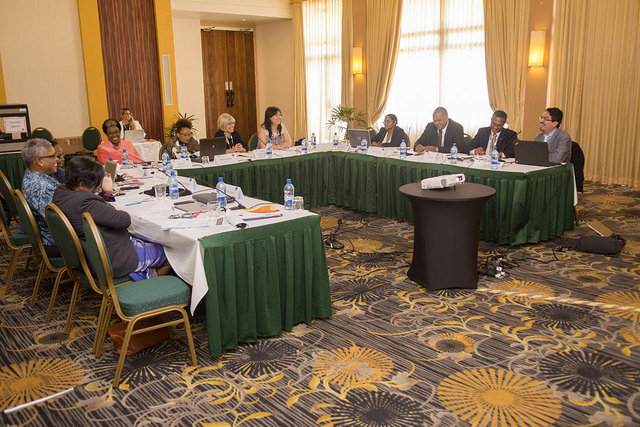Quality standards for accreditation of DDR programmes: end the stage of idiom adaptation and the countries move towards a tool for conducting fieldwork
COPOLAD’s quality standards system is organized according to the intervention scope, levels of demand and nature of the standard. The complete system is made up off a total of 174 criteria; 25 common to all DDR programs, 52 for prevention criteria, 5 specific for risks reduction, 53 for treatment, 5 for harm reduction and 34 for social integration. When distinguishing by levels of demand a maximum of 124 criteria may be applied to the basic level and the complete set of 174 criteria for the advanced level.
As a first step, both groups of participating countries from Latin America organized national experts’ teams in order to review each of the criteria and adapt them to local Spanish taking into account cultural, legal and linguistic factors. This task was supported by COPOLAD through the methodological orientation of the Task Force and the experts coordinating each Working Group.
The first working group will implement soon the first pilot in the scope of treatment. The second group had a meeting in Costa Rica (September) and is also ready for the pilot on prevention. The group composed of the Caribbean countries had a meeting in Guyana (October), finished language adaptation and now works in the integration with other quality systems like the one proposed by CARICOM.
Finally, all this demanding work ended up as a success and in the first group, a total of 15 countries from Latin America will make a pilot project in the case of treatment. Out of these, Argentina, Chile, Colombia, Costa Rica, Cuba, Ecuador, and Uruguay worked on 53 of the treatment criteria and 25 of the common ones considered at the advanced level. On the other hand, El Salvador, Guatemala, Honduras, Mexico, Panama, Paraguay, Peru, and Venezuela, worked on 39 criteria for treatment and 18 of the common ones from the basic level. The first group is led by Chile through its National Service for the Prevention and Rehabilitation of Drug and Alcohol Consumption (SENDA) and has much advanced into the second step which implies to build indicators and control parameters as part of the validation tool for the fieldwork. At this stage, the countries also made contact with the treatment centers that will be evaluated in the pilot.
The second group consists of 10 countries led by Costa Rica by means of the Costa Rican Drug Institute (ICD). A pilot project to validate the criteria will be made on Prevention in which 25 common standards and 52 prevention ones are considered. Argentina, Chile, Colombia, Costa Rica, Guatemala, Honduras, Mexico, Panama, Peru and Venezuela also concluded the language adaptation process and are working on the tool to evaluate the prevention programs at the same time they had contact with the programme running the pilot that, in this case, is expected they come from different scopes like the educational, community or labor systems. The protocol to implement the pilot was agreed at the first meeting held the 27th and 28th of September in San Jose, Costa Rica. The group of countries and experts benefited from the presence of members of the Advisory Council and its representation from the Cooperation Programme between Latin America, the Caribbean and the European Union on Drugs Policies (COPOLAD), the Pan American Health Organization (PAHO/WHO), the Inter-American Drug Abuse Control Commission (CICAD/OAS), the Ibero-American Network of NGOs in the field of Drugs (RIOD) and the International Drug Policy Consortium (IDPC). In both the working groups, Treatment, and Prevention, RIOD included centers and programme that will also participate in the validation and pilot projects as a way to enhance work on quality and evidence.
On the other hand, English speaking countries from the Caribbean led by Trinidad and Tobago and its National Drug Council (NDC), form the third working group. Adaptation to English of the prevention, treatment and common criteria was finished by a group of experts from The Bahamas, Grenada, Jamaica and Trinidad and Tobago, all of them with previous experience on formulating standard criteria for the Caribbean Community (CARICOM). This group of experts had the opportunity to meet at Georgetown, Guyana, the 3rd and 4th of October, where the final version language adapted was approved. Afterwards started the work to integrate the system with other quality systems like the one proposed by CARICOM. The protocol for the pilot project was also approved and the process to build a fieldwork tool was initiated by the Caribbean experts with the active participation of the Advisory Council members in this case from PAHO/WHO and CICAD/OAS. Along the first trimester of 2018, an invitation will be made to enlarge the number of countries from the Caribbean region that want to join the next steps and the fieldwork pilot. CARICOM has been an important ally in all this process.
In this way, all the three groups are making sustainable progress on the process of validating the quality and evidence-based criteria aiming the intuitional strengthening for the accreditation of DDR programmes in the region.
End of the International edition of the 2017 on-line capacitation courses for Latin America
During the second half of 2017, COPOLAD started the first edition of international courses in Spanish. Each course lasts 6 months and this edition finished by the end of December or the beginning of January. A total of 187 professionals from the public sector (63,64% women) went through the capacitation in different areas.
Evaluation from the participants has been very positive.
I want to thank the opportunity to take part of this capacitation that I consider of a high level. I had done other online courses (included Master) and this one is much better. Documents, supervision by the teacher have made possible to achieve the objectives. This learning experience has been excellent. - Mercedes Ivelisse German.
COPOLAD wants to thank the interest and participation from all countries in this edition and make an especial mention to the leadership of Chile, Peru, and Uruguay. Courses are now available for the countries that want to implement their own national editions.
Perspectives for 2018:
-
Next International online editions in English and Portuguese. Along the first half of the year, it is planned to start the International editions in English and Portuguese with the aim to support countries from the English speaking Caribbean and Brazil in the enhancement of professional competencies.
-
The fourth course is finished and ready to teach. In May 2018 a new course, ready to be implemented, will be available: Comprehensive approach to the prevention and reduction of the adverse consequences of drug use in populations in a situation of high vulnerability: a public health strategy. The main objective of this course is to focus the attention on persons with a problematic use of drugs and especially groups at most vulnerable situations form a health or social point of view and always adopting an integral perspective of the public health. Also will take account of interventions led to leaser the effects of negative consequences of drug use with special emphasis on those with a communitarian perspective of analysis and practice.


